|
|
|
|
|
|
|
|
No Arctic-science events are formally scheduled for today.
|
Media
As the Arctic Warms, Scientists at This Remote Field Station Try to Make Sense of the Changing Environment. As Alaska's climate changes, almost every veteran researcher at Toolik Field Station, the Arctic research center just north of the Brooks Range, has a story about lightning. Linda Deegan, a senior scientist at Woods Hole Research Center in Massachusetts, was enjoying a beer by Toolik Lake when she saw her first strike. She remembers uttering an expletive when she saw it. Alaska Dispatch News
Northern Fleet Begins Evacuating Scrap Metal From Arctic Island. The Russian Northern Fleet began evacuating scrap metal from the Kotelny Island in the Arctic (the Novosibirsk Islands archipelago), the Fleet's press service said on Monday. "Today, we have finished uploading containers (with scrap metal - TASS) on the Kapitan Danilkin vessel, which in early September brought to the Kotelny Island food and construction material before the winter," the press service said, adding "the vessel will soon head for the mainland to deliver the scrap metal there." TASS
 Military Bill Could be Key for Climate Policy. Military Bill Could be Key for Climate Policy. The annual defense bill will take center stage in the Senate this week, with several energy and environmental issues in tow, including the nation's response to global warming. The chamber will take a procedural vote on the National Defense Authorization Act tonight, and lawmakers expect to tackle roughly 30 amendments in the coming days. E&E News
Geophysical Institute Aims Research Toward Defense. In an effort to gain more federal funding, the Geophysical Institute at the University of Alaska Fairbanks said it plans to tailor some of its future research toward the Department of Defense. "The signals from the highest levels of the U.S. government are to decrease science funding and put more funding into the Department of Defense," said Robert McCoy, director of the geophysical institute. "So we're hoping to pivot more toward the Department of Defense with still the same types of things we've been doing." Fairbanks Daily News Miner
Alaska's Small High-Mountain Glaciers Play a Big Role in Groundwater and River Systems. The small and sometimes patchy glaciers that cling to high mountain slopes in Alaska appear to be big players in groundwater and river systems far from the sea. That is the conclusion of a University of Alaska Fairbanks-led study that traced the melt from one of those high-altitude glaciers to the groundwater that flows, ultimately, into a major Alaska river. The study focused on Jarvis Glacier in the eastern Alaska Range, the nearby and better-monitored Gulkana Glacier and the points downstream from them. Alaska Dispatch News
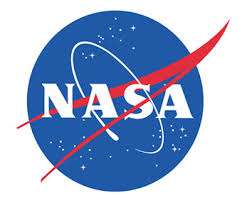 NASA Flights Map Summer Melt of Greenland Ice Sheet. NASA Flights Map Summer Melt of Greenland Ice Sheet. Operation IceBridge is flying in Greenland to measure how much ice has melted over the course of the summer from the ice sheet. The flights, which began on Aug. 25 and will go on until Sept. 21, repeat paths flown this spring and aim to monitor seasonal changes in the elevation of the ice sheet. "We started to mount these summer campaigns on a regular basis two years ago," said Joe MacGregor, IceBridge's deputy project scientist and a glaciologist with NASA's Goddard Space Flight Center in Greenbelt, Maryland. "If the flights go as expected, the result will be a high-quality survey of some of the fastest melting areas in Greenland and across as much of the island as possible." Phys.org
|
|
Future Events
** new this week **
The US Arctic Research Commission's Working Groups, September 12, 2017, 2:00 pm Eastern. Webinar by Dr. Cheryl Rosa and sponsored by
 |
|  | Dr. Cheryl Rosa
USARC Deputy Director |
the Alaska Center for Climate Assessment and Policy. A primary duty of the US Arctic Research Commission (USARC) is to interact with Arctic residents, international Arctic research programs and organizations, and local institutions including regional governments, in order to obtain the broadest possible view of Arctic research needs. To facilitate this, the USARC coordinates working groups to examine and develop research needs for specific topics-generally based on feedback from stakeholders. USARC's Anchorage-based office currently coordinates three working groups: the Alaska Rural Water and Sanitation Working Group, the Arctic Renewable Energy Working Group, and the Arctic Mental Health Working Group. USARC working groups.
Interagency Arctic Research Policy Committee (IARPC) webinar on "Outcomes of the US Chairmanship of the Arctic Council," September 19, 2017 at 1pm Eastern time  . The US Senior Arctic Official, Julie Gourley, will provide an overview of the highlights of the US chairmanship, John Farrell, Executive Director of USARC, will speak about the new, legally binding "Agreement on Enhancing International Arctic Scientific Cooperation," and project leads (Dr. Roberto Delgado, Ms. Sarah Abdelrahim) will present the outcomes of select science-related chairmanship initiatives. More here. . The US Senior Arctic Official, Julie Gourley, will provide an overview of the highlights of the US chairmanship, John Farrell, Executive Director of USARC, will speak about the new, legally binding "Agreement on Enhancing International Arctic Scientific Cooperation," and project leads (Dr. Roberto Delgado, Ms. Sarah Abdelrahim) will present the outcomes of select science-related chairmanship initiatives. More here.
- Small and off-grid community energy solutions
- Oil and gas development
- Renewable energy
- Regulation and Financing
- Transportation and transmission
The AES is a multi-disciplinary event expected to draw several hundred industry officials, scientists, academics, policy makers, energy professionals and community leaders together to collaborate and share leading approaches on Arctic energy issues.
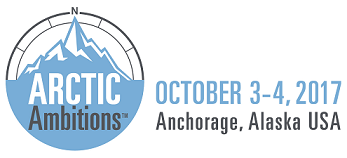 Arctic Ambitions VI: International Business Conference & Trade Show, October 3-4, 2017 (Anchorage, Alaska USA). Arctic Ambitions VI: International Business Conference & Trade Show, October 3-4, 2017 (Anchorage, Alaska USA). For the 6th year in a row, World Trade Center Anchorage will host the Arctic Ambitions Conference - an event focused on trade, commerce, and investment in the region. This year, the theme of the conference is New Arctic Realities: The Path Forward. With this theme, the following areas will be highlighted: transportation, technology and innovation, infrastructure development, natural resource exploration and production, international trade opportunities, finance and investment, pan-Arctic commerce, and the new political climate toward Arctic development under
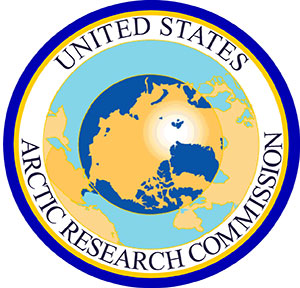 the Trump Administration.
5th Northern Oil and Gas Research Form, October 11-13, 2017 (Anchorage, Alaska USA). The United States is hosting the 5th Northern Oil and Gas Research Forum from October 11-13, 2017, in Anchorage, Alaska. This meeting will feature current research and highlight information needs for management of petroleum activities in the US and Canadian Arctic. Abstracts for poster presentations on research and how research is used in management actions are presently being solicited. Please visit the Forum's website (here) for additional details. Deadline for abstract submission is September 10. There is no registration fee for the Forum. Please use the website link above for information on registration, agenda, lodging and transportation.
2017 Arctic Circle Assembly, October 13-15, 2017 (Reykjavik, Iceland). The annual Arctic Circle Assembly is the largest annual international gathering on the Arctic, attended by more than 2000 participants from 50 countries. The Assembly is held every October at the Harpa Conference Center and Concert Hall and is attended by heads of states and governments, ministers, members of parliaments, officials, experts, scientists, entrepreneurs, business leaders, indigenous representatives, environmentalists, students, activists and others from the growing international community of partners and participants interested in the future of the Arctic.
5th Alaska Native Health Research Conference, October 16-18, 2017 (Anchorage, Alaska USA). This conference provides a forum to share current health research occurring in Alaska with Alaska Native people. The theme of the conference is "Strengthening Communities through Research for a Healthier Tomorrow". Health topics to be discussed include aging, suicide, health risks associated with added sugar in the diet, infectious disease, and cancer. The conference aims to engage attendees in a fruitful dialogue on the research currently happening in communities, and how to improve research so that it is respectful of and reflects the needs of the Alaska Native people and their communities. We will also identify the areas where research is not being conducted and discuss ways to address these research gaps. This event is sponsored by The Alaska Native Tribal Health Consortium (ANTHC) Health Research Review Committee.
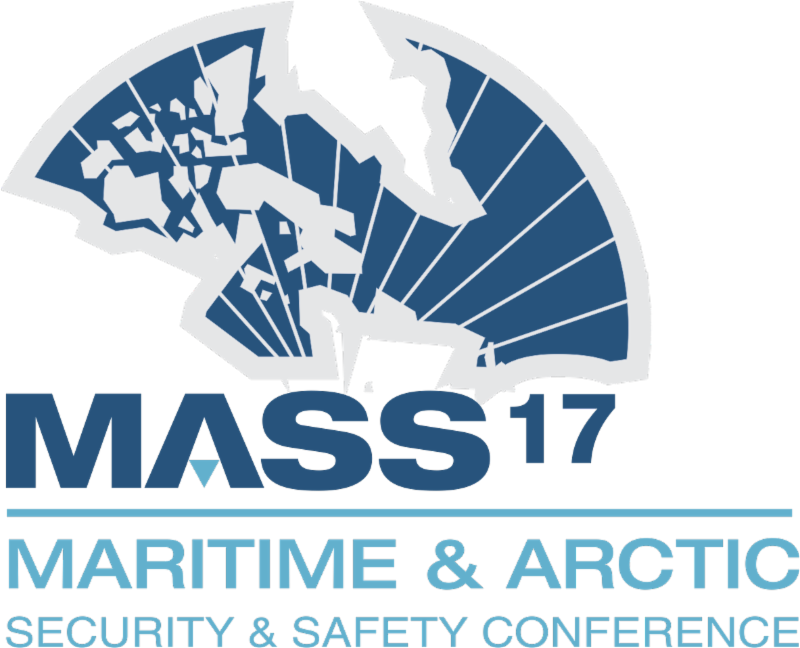 Maritime & Arctic Security & Safety Conference (MASS17) "Arctic Horizons," October 31- November 1, 2017 (Newfoundland & Labrador Canada). Now in its fifth year, MASS has gained an international reputation as a must-attend event to gain a wide perspective on challenges, opportunities and policies related to the Arctic and North Atlantic maritime environments. The aim of this Government of Canada and the Government of Newfoundland and Labrador supported international conference is to promote stakeholder collaboration, technological innovation, harsh environment research & development, and world-class education efforts that are contributing to both Maritime and Arctic issues. This two day conference will draw a diverse group of speakers and attendees representing government, military, Canadian and U.S. Coast Guard, industry, academic leaders, Northern Leaders, research and other key stakeholders. We hope you can join us to be a part of this important dialogue Maritime & Arctic Security & Safety Conference (MASS17) "Arctic Horizons," October 31- November 1, 2017 (Newfoundland & Labrador Canada). Now in its fifth year, MASS has gained an international reputation as a must-attend event to gain a wide perspective on challenges, opportunities and policies related to the Arctic and North Atlantic maritime environments. The aim of this Government of Canada and the Government of Newfoundland and Labrador supported international conference is to promote stakeholder collaboration, technological innovation, harsh environment research & development, and world-class education efforts that are contributing to both Maritime and Arctic issues. This two day conference will draw a diverse group of speakers and attendees representing government, military, Canadian and U.S. Coast Guard, industry, academic leaders, Northern Leaders, research and other key stakeholders. We hope you can join us to be a part of this important dialogue
 Polar Law Symposium 2017 and Rovaniemi Arctic Spirit, November 13-16, 2017 (Rovaniemi, Finland). The purpose of the Polar Law Symposium is to examine, in detail, the implications of the challenges faced by the Polar Regions for international law and policy and to make recommendations on appropriate actions by states, policy makers and other international actors to respond to these emerging and re-emerging challenges. The Rovaniemi Arctic Spirit Conference is integrated with the Polar Law Symposium, which will be organized by the Northern Institute for Environmental and Minority Law at the Arctic Center of the University of Lapland. Polar Law Symposium 2017 and Rovaniemi Arctic Spirit, November 13-16, 2017 (Rovaniemi, Finland). The purpose of the Polar Law Symposium is to examine, in detail, the implications of the challenges faced by the Polar Regions for international law and policy and to make recommendations on appropriate actions by states, policy makers and other international actors to respond to these emerging and re-emerging challenges. The Rovaniemi Arctic Spirit Conference is integrated with the Polar Law Symposium, which will be organized by the Northern Institute for Environmental and Minority Law at the Arctic Center of the University of Lapland.
AGU Fall Meeting, December 11-15, 2017 (New Orleans, LA USA). Fall Meeting is the largest and preeminent Earth and space science meeting in the world. The 2017 Fall Meeting will take place in New Orleans, Louisiana, offering attendees the chance to discover a new location that features world renowned cuisine, music, arts and culture, and provides access to vital scientific ecosystems. Fall Meeting will offer a unique mix of more than 20,000 oral and poster presentations, a broad range of keynote lectures, various types of formal and informal networking and career advancement opportunities, scientific field trips around New Orleans, and an exhibit hall packed with hundreds of exhibitors.
ArcticNet invites the global Arctic research community to Arctic Change 2017! This conference will bring together Arctic researchers and students with Inuit, Northerners and government, industry and NGO stakeholders. The world's foremost Arctic scientists will present research findings and discuss impacts of climate change and modernization. With 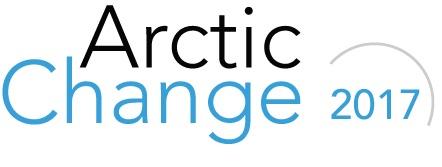 over 1500 participants expected, Arctic Change 2017 will be one of the largest trans-sectoral international Arctic research conferences held in Canada. We welcome students and early career researchers to participate in "Student Day" at the start of the Conference. See an excerpt from last year: ArcticNet ASM2016. over 1500 participants expected, Arctic Change 2017 will be one of the largest trans-sectoral international Arctic research conferences held in Canada. We welcome students and early career researchers to participate in "Student Day" at the start of the Conference. See an excerpt from last year: ArcticNet ASM2016.
ISAR-5 Fifth International Symposium on Arctic Research, January 15-18, 2018 (Tokyo, Japan).The fifth ISAR has been planned at the recommendation of the science steering committee of ISAR-4, which was held in Toyama, Japan in April 2015. The fifth ISAR will be devoted to discussions on environmental changes in the Arctic and their regional and global implications, to seek additional international scientific collaboration in this area by gathering, synthesizing and sharing information related to these changes occurring in the Arctic. Special emphasis will be placed on the fields of the social sciences and humanities, which were not included in the previous ISARs. ISAR-5 will consist of general sessions and special sessions. The general sessions will address the following topics: atmosphere; ocean and sea ice; rivers, lakes, permafrost, and snow cover; ice sheets, glaciers, and ice cores; terrestrial ecosystems; marine ecosystems; geospace; policies and economy; and social and cultural dimensions. Special sessions will be solicited on cross-cutting themes.
2018 Arctic Frontiers: Connecting the Arctic, January 21-26, 2018 (Tromso, Norway). Arctic Frontiers is an international arena on sustainable development in the Arctic. The conference addresses the management of opportunities and challenges to achieve viable economic growth with societal and environmental sustainability. Arctic Frontiers brings academia, government and business together to create a firmer foundation for decision-making and sustainable economic development in the Arctic. Join the Arctic Frontiers conference preparing the new Arctic future. The conference takes place the fourth week of January in the Norwegian city of Tromsø, known as the Gateway to the Arctic. Conference organizers are accepting online abstracts for oral or poster presentation through September 19th.
Alaska Marine Science Symposium, January 22-26, 2018 (Anchorage, Alaska.)
The Alaska Marine Science Symposium (AMSS) is Alaska's premier marine research conference. For over 20 years, it has brought together scientists, educators, resource managers, students, and the public to discuss marine research conducted in Alaskan waters. Over 700 people attend this 4-day long conference held annually in January. Each day of the conference highlights Alaskan marine ecosystems: Arctic (Tuesday), Bering Sea & Aleutian Islands (Wednesday), and the Gulf of Alaska (Thursday). Research topics discussed range from ocean physics, fishes and invertebrates, seabirds, marine mammals, to local traditional knowledge. Website for 2018 meeting is here.
Alaska Forum on the Environment, February 12-16, 2018 (Anchorage, Alaska)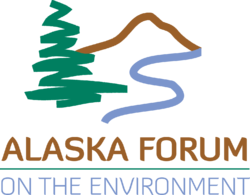 . AFE is a statewide gathering of environmental professionals from government agencies, non-profit and for-profit businesses, community leaders, Alaskan youth, conservationists, biologists and community elders. The diversity of attendees sets this conference apart from any other. The 2018 event will be our 20th year providing a strong educational foundation for all Alaskans and a unique opportunity to interact with others on environmental issues and challenges. . AFE is a statewide gathering of environmental professionals from government agencies, non-profit and for-profit businesses, community leaders, Alaskan youth, conservationists, biologists and community elders. The diversity of attendees sets this conference apart from any other. The 2018 event will be our 20th year providing a strong educational foundation for all Alaskans and a unique opportunity to interact with others on environmental issues and challenges.
The Effects of Climate Change on the World's Oceans, June 4-8, 2018 (Washington, DC USA).
The 4th International Symposium will bring together experts from around the world to better understand climate impacts on ocean ecosystems - and how to respond. The event is hosted by a variety of groups including International Council for the Exploration of the Sea (ICES), North Pacific Marine Science Organization (PICES), Intergovernmental Oceanographic Commission of UNESCO (IOC), and Food and Agriculture Organization of the United Nations (FAO).
 POLAR 2018, June 15-27, 2018 (Davos, Switzerland).POLAR2018 is a joint event from the Scientific Committee on Antarctic Research (SCAR) and the International Arctic Science Committee (IASC). The SCAR meetings, the ASSW and the Open Science Conference will be hosted by the Swiss Federal Institute for Forest, Snow and Landscape Research WSL under the patronage of the Swiss Committee on Polar and High Altitude Research. The WSL Institute for Snow and Avalanche Research SLF is organizing POLAR2018. POLAR 2018, June 15-27, 2018 (Davos, Switzerland).POLAR2018 is a joint event from the Scientific Committee on Antarctic Research (SCAR) and the International Arctic Science Committee (IASC). The SCAR meetings, the ASSW and the Open Science Conference will be hosted by the Swiss Federal Institute for Forest, Snow and Landscape Research WSL under the patronage of the Swiss Committee on Polar and High Altitude Research. The WSL Institute for Snow and Avalanche Research SLF is organizing POLAR2018.
17th International Congress of Circumpolar Health (ICCH17), August 12-15, 2018 (Copenhagen, Denmark). The ICCH congresses are held every third year in different locations in the circumpolar area and represent the largest scientific meetings worldwide on circumpolar health. The ICCH congresses serve as the primary source of information exchange and scholarly communication in issues relating to circumpolar health. More than 750 participants generally register and participate in each Congress, and more than 400 scientific papers or posters are usually presented.
Arctic Biodiversity Congress, October 9-11, 2018 (Rovaniemi, Finland). The second Arctic Biodiversity Congress is hosted by the Conservation of Arctic Flora and Fauna (CAFF), the biodiversity working group of the Arctic Council, and the Ministry of the Environment, Finland. The second Arctic Biodiversity Congress will build on the success of the first Congress, held in 2014 in Trondheim, Norway, and will bring together scientists, policymakers government officials, Indigenous representatives, Traditional Knowledge holders, industry, non-governmental organizations, and others to promote the conservation and sustainable use of Arctic biodiversity.
|
|

  
4350 N. Fairfax Drive, Suite 510
Arlington, VA 22203, USA
External links in this publication, and on the USARC's World Wide Web site ( www.arctic.gov) do not constitute endorsement by the US Arctic Research Commission of external Web sites or the information, products or services contained therein. For other than authorized activities, the USARC does not exercise any editorial control over the information you may find at these locations. These links are provided consistent with the stated purpose of this newsletter and the USARC Web site.
|
|
|
|
|
|
|
|
|